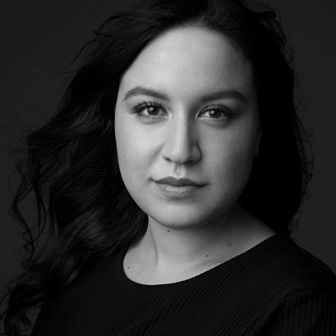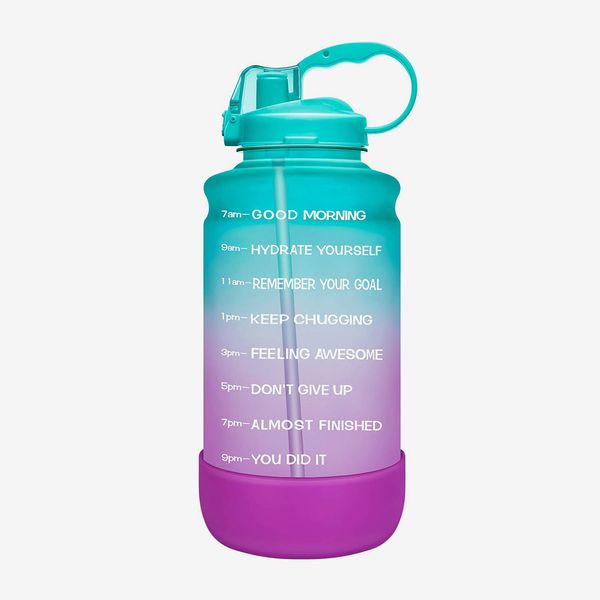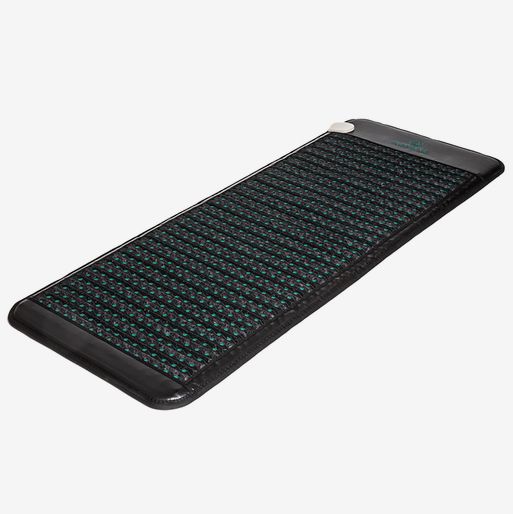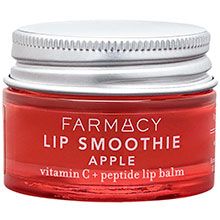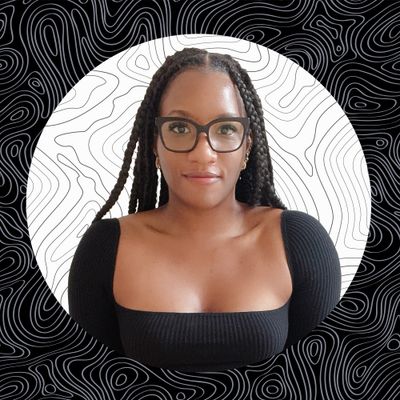
Some 21 weeks ago, as recorded on Instagram, Danielle Prescod declared, “Competitive water-drinking is my new legacy.” She backed up the statement with a compilation of Instagram Stories shared by her friends and followers after she’d influenced them to buy a 64-ounce (and, in some cases, a 128-ounce) motivational water bottle.
Prescod is the co-founder of 2BG Consulting, which offers anti-racism seminars and resources with the aim of “fixing” the fashion industry; the author of the upcoming book Token Black Girl; and a former BET.com style director. Hydration is a huge part of her wellness routine. “I’m always asking myself, ‘How much water can I drink a day?’ because that makes me feel like my body isn’t dragging,” she says. Ultimately, “If everything is working to optimal function, that is where I’m trying to be at all times.” Below, Prescod talked to the Cut about recovering from an eating disorder, the conversations that led up to freezing her eggs, and how she practices anti-racism through wellness.
On defining wellness: Wellness is whatever you want it to be, and I think that needs to become more accepted. It’s unfortunate that participating in wellness has almost become competitive. I don’t like that at all, because the reason I became interested in wellness was that I was so stressed out from my life and how much I was working. I do realize that my participation in wellness is also rooted in consumerism, and that I have a certain spending power that I’m able to use toward that — but I’m trying to just feel as good as possible at all times. It’s really a holistic approach. It’s not just about skin-care products or “clean beauty” or any of that. It really is about things like sleep hygiene — how much uninterrupted sleep can I get in a night that’s not full of anxious dreams or thoughts?
On what she’s learned after a year-plus of the pandemic: I don’t want to be like, “Oh, the pandemic is such a blessing,” because it’s not. But it did help to put a lot of things in perspective for me, like how taxing my schedule was, and that has really helped me become more aware of how I work, where I can put my time and energy because I was putting it into everything at all times and I was always exhausted. That was my life in New York. All of my friends, everyone around me, was in that grind, and when all of that was taken away, I was like, “I actually didn’t like that, and it didn’t feel good.”
On moving to New Orleans, Louisiana: I would not recommend moving during a pandemic. Logistically, it was very difficult, but I really wanted to move somewhere that was slower. The thing about my apartment in New York is that I never signed my lease with the intention to spend a lot of time there. It was my home base, I could walk to work from there, I had things around that I enjoyed doing, but I wasn’t like, “This is my dream home, it’s my forever home.” Then when it became my everything — my restaurant, my gym, my office, where I slept — I was like, “This is not good.” I lived on First Avenue, and it was so loud all the time. The noise pollution was getting to me — when you’re on Zoom calls all the time, and constantly have sirens going by or a horn honking or people shouting, it was too much.
I also wanted to avoid winter, and I didn’t want to go too far. I moved in December, and at the time, Los Angeles was having a really rough time with COVID. L.A. is where most of my community is. I spent a lot of time for work there. So that’s where I knew the most people, but I was like, “I don’t think I can go here.” Also, it’s a really far plane ride. So I was like, “Let me move somewhere where the time difference is not that drastic because I’m still working East Coast hours, and I don’t want to have to wake up at 5 a.m. to get to meetings, and I can avoid winter and have a slower pace of life.” Right now, I live in a two-bedroom, two-bathroom apartment in a gorgeous building in the French Quarter, and I pay less than I paid for a studio apartment in Manhattan.
Also, I quit my job last year, and I felt that I needed to live in a smarter way, and New York is not that. You work so hard, and you should get to enjoy your life. I’m like, “The salary that I made in New York, I don’t understand why I still feel all of this stress all the time. I should be living stress-free.” And now that I moved to Louisiana, I can.
On mornings: I usually wake up around 7:30 a.m. or 8 a.m. This morning, I woke up a bit earlier because it was pouring rain here, and you can really hear the rain — I’m still not used to that yet. I meditate every morning — sometimes it’s affirmations, sometimes it’s manifesting, sometimes it’s gratitude, whatever I feel that day. Usually, I’ll let the InsightTimer app guide me and that takes 15 to 20 minutes.
I make my bed every single morning before I do anything else, mostly so I don’t get back in it. My mom was really, really adamant about us always making our bed, and it’s a habit that stuck. Then I brush my teeth. I do my skin care. I get dressed — I pretty much wear leggings and a sports bra every day, although I’m starting to have to get dressed again, and it’s been nice to do that. Then I make my matcha latte with oatmeal. In between all of that, I’m checking emails, responding to text messages, all of that stuff. On the weekends, I’ll make healthy pancakes with quinoa flour, but I usually don’t have time for an extensive breakfast during the weekdays, so I’ll have a banana, or I’ll have an English muffin with cream cheese. Then I have meetings.
On noticing hunger: I am in eating-disorder recovery. I am really still learning to eat like a normal person. I probably eat way fewer calories than I should, but the point is that I eat when I’m hungry. I spent so much of my life pretending like I was never hungry at all and just ignoring it. To notice when I’m hungry and be like, “I’m going to stop and address that,” is a really big step. I don’t follow any particular diet, and I no longer have any kind of restrictions on what I eat.
On exercise: I have not been to a yoga class since the pandemic started. I do it in my house. But I’m probably going to start going in person because I really do miss the ritual.
I go to the barn once a week for my horse-riding lesson, which is usually 30 minutes — I would go more if I had a car, but I don’t have a car yet. It’s really, really, really therapeutic for me. It’s so nice to be around horses. They all have different personalities, and it’s a good challenge both physically and mentally.
Then I also go to 1-1 Pilates. My teacher’s name is Adelaide, and her business is called House of Skye, and she has a reformer there. She also does aerial yoga, she does regular yoga, she does everything — she even does reiki. That’s very New Orleans, to have everything. I usually do that twice a week, and I walk home — it’s about three miles.
On practicing anti-racism through wellness: One thing that I think has been helpful for me is to not agree to do things that feel colonized. For example, there is a big discussion about the Westernization of yoga, the commodification of yoga, so I go to a studio that has a significant amount of diversity both in the staff and who is taking the class. That’s important to me.
Across the board, any business that I’m going to trust with my wellness, I want them to really live the mission. A few weeks ago, somebody was like, “I want to send you this self-help book, and I want to send you a face mask to do.” It was a mask that you mix together, and I was like, “All of that is single-use plastic,” which no, because that, to me, is so antithetical to the mission of being well. Like, you’re ruining the planet just so I can put this mask on. I also really liked this girl, and I really liked her methods. I had become a subscriber of her meditation app, but they never really had any people of color, and it’s so grating to me to have white women be the faces and the dictators of, “This is how you breathe, this is your wellness,” when they basically have no problems. Of course, everyone has things they’re getting over, but systemically, no problems. Or it’s just not intersectional enough to really be inclusive. So I said to them, “I had to get rid of this app because I was so consistently frustrated.”
Being vocal about those things is important because people don’t even realize. They’re like, “I don’t want to bring negativity to the space so I don’t want to talk about racism. I don’t want to talk about the ways that there’s inequity in the world. That’s not what we’re about. We’re about positivity.” And it’s like, well, I don’t feel like you can be positive if you don’t address these things, because it’s not like silence helps them go away.
On plastic: If you care about your own autonomy, your own personal wellness, it’s so disjointed to not look at the collective wellness — and that includes the planet. You really have to be conscious of being a consumer in general.
Because I am someone who gets stuff sent to them, I don’t want wasteful packaging. I’ve always said to beauty brands, “I don’t need the pomp and circumstance. If you want me to try this thing, just send me that thing.”
Now that I moved to the South, they do not recycle. I was in San Francisco last week, and it was like, “Here’s our compost. Here’s our paper. Here’s our plastic. Here’s our trash.” When I moved to New Orleans, I remember being like, “I don’t know where to put this,” and this girl was like, “Just put it in the regular. We don’t do recycling here.” There’s a group of Tulane students that will collect glass, plastic, and all that stuff, but you have to drive it to them. Since I don’t have a car yet, all of these things are very difficult, so I try to just not have plastic in my life, and I’m even eating differently. For example, when you go to Whole Foods, if you get preprepared food, it usually comes in plastic. So I’m like, “Now I have to learn to cook things,” since I’m not getting that stuff because I can’t recycle it.
On freezing her eggs: I decided to do it because I turned 30, and I didn’t have a partner, and the person who I thought I was going to marry, we broke up. A friend who is a bit older than me did it, and she was like, “I have a family. I have a sister. I have parents who love me. I have a community that can help me. Why am I so stressed out about a man?” I was like, “I never thought of it like that. I have the same exact setup.” I was only thinking about it one way, kind of on this track: You graduate high school, then you go to college, then you get a job, then you get married, and then you have a baby. But you can do all those things in any kind of order you want, and you can have a baby by yourself.
I looked into it, and they told me that they suspected that I would have a lot of eggs, so there wasn’t really a need to do it right then. However, I also know that it’s better to do it when you’re on the younger side. I had to go to a seminar. A lot of the women there were at least ten years older than me, and they were looking at these charts and graphs of your egg health and how many you can produce. You’re born with all the eggs you’re ever going to have, but you shed them every single day — the same way you shed skin cells, the same way you shed hair cells, all of that is also happening to your eggs. The older you get, the more at a disadvantage you are of getting the outcome that you would want from egg freezing.
I wish that people would discuss this with you. On The Mindy Project, Dr. Mindy Lahiri was going to colleges to tell girls, “You should freeze your eggs,” and that’s exactly when you should do it. Like, “Hey, don’t feel pressure to get a man. Get married if you want, but do this as your own personal insurance policy.” I’ve witnessed a lot of women who are older than me say, “I’m 40. I’m ready to have a family,” and they had so many problems getting pregnant, but no one had told them to think about it earlier.
Two Wellness Items Danielle Swears By
I fill up my water bottle every morning. No matter what time I start drinking, I always fill it up to the 7 a.m. line, and I try to fill it twice, and usually by 3 p.m., I’m done with the first one, and then I fill it up again so I can get a gallon in during the day. But when I was writing my book, every five seconds I was peeing, and I was like, “I have to suspend water drinking through this day because I can’t get a thought out, and I need to turn in 92,000 words.”
I used to go in person to Shape House. I loved it because I would go there, watch Netflix, and sweat, and it was amazing, but of course, I couldn’t do that during the pandemic. I knew that HigherDose made a sauna blanket, but I was just like, “It’s so big, I don’t know if I want that in my house.” And again, I really like the ritual of doing things outside of my home — I don’t want to do everything in my house — but necessity breeds innovation, so I got the blanket last year.
Then HigherDose came out with the PEMF Mat, and then they were like, “We’d love to gift you one.” I was very skeptical at first. It is incredibly heavy because it’s 20 pounds of crystals plus the whole apparatus, but the first night I used it, I had such a deep and amazing sleep. I’ll admit, it’s hard to buy into because it doesn’t feel like anything. You just lie there, and there’s no buzzing, nothing. But it’s frequency therapy. You can mimic the brain waves where certain things are happening. So, level one is for sleep, so the mat mimics the brain waves of your body in deep sleep — I use that one almost every night before bed. Level two is for dreaming, and it’s so funny because when my sister came to visit me, I made her use the mat, and I turned it on level two, and I didn’t tell her, and then the next day she was like, “My dreams were insane. What’s going on?” The third level is for meditation, so I use that one in the morning to help me get into a meditative state faster. Then the fourth level is for focus, so sometimes I’ll sit cross-legged, and I’ll work on the mat.
You don’t feel anything during. Actually, I notice it more when I’m not able to use it. That’s when I miss it. Now it’s been two months, and I love it. I make everyone try it.
